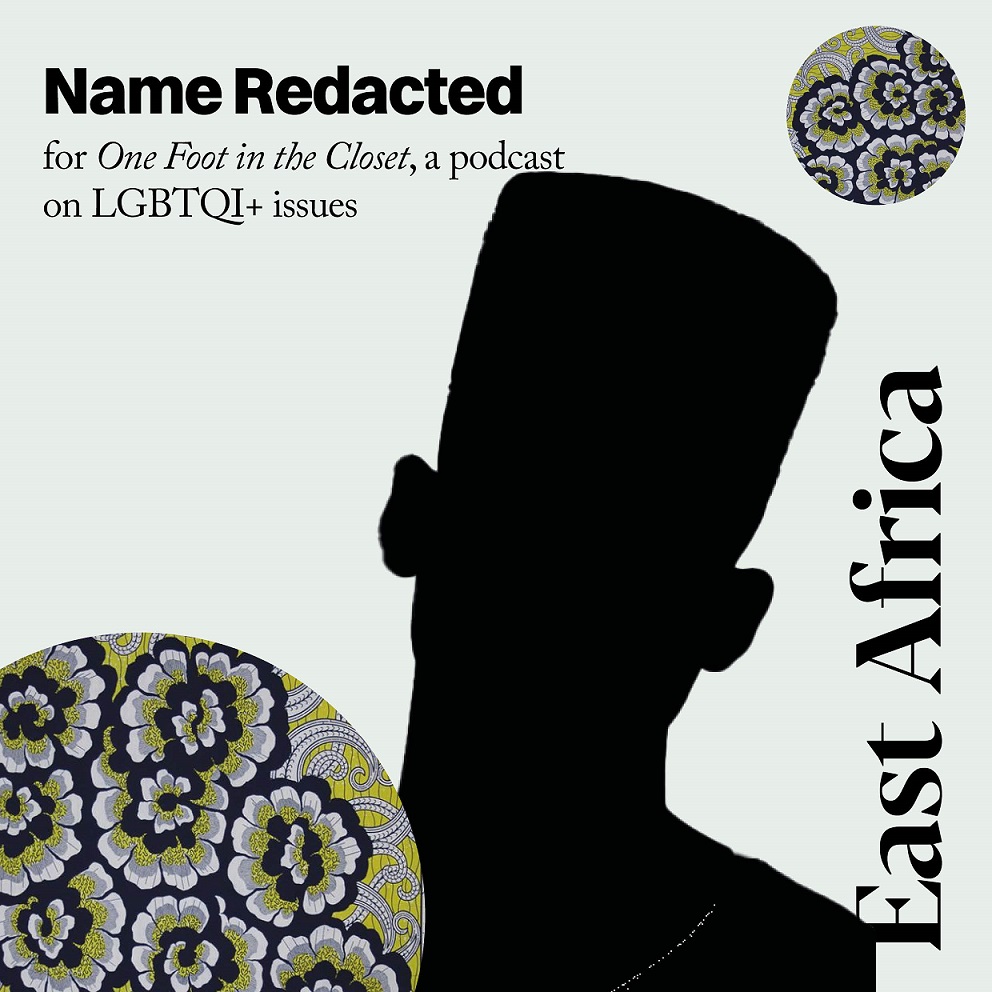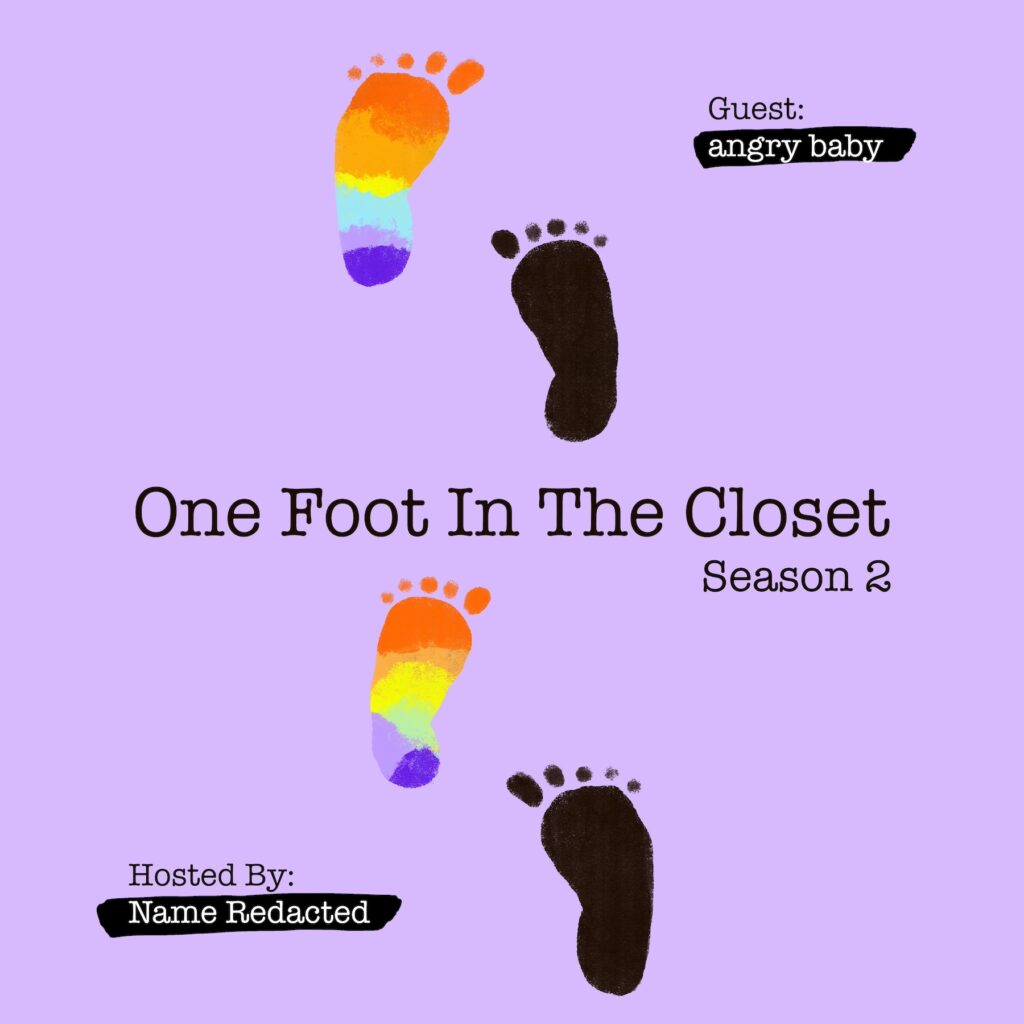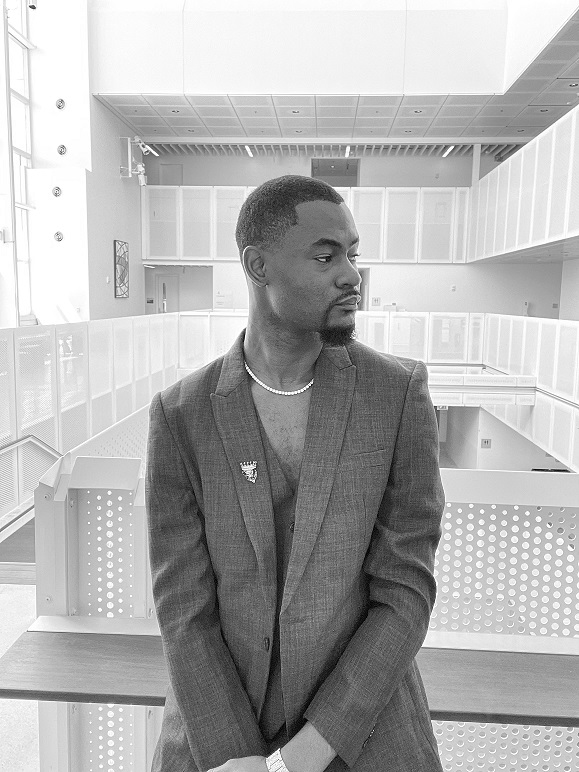Name Redacted is among the five recipients of the inaugural Open Country Mag Curatorial Fellowship, sponsored by Africa No Filter. Their proposal was to record Season 2 of One Foot in the Closet, a podcast on LGBTQI+ experiences. The initiative supported One Foot in the Closet with $1,000 and mentorship by Open Country Mag editor Otosirieze, Lumen Prize winning artist Minne Atairu, and A Nasty Boy founder Innanoshe Akuson.
Name Redacted is a queer, polygender East African podcaster. They are the creator and host of One Foot in the Closet. Season 1 of the podcast was funded by a Queering Encounters in African Feminisms Grant from The House of African Feminisms, a project by the Goethe-Institut Kigali, Goethe-Institut Lagos, and Goethe-Institut Johannesburg.
The first two episodes of Season 2, “Angry Baby” and “Mugarura: Part 1,” appear at the end of this interview.


What is One Foot in the Closet?
One Foot in the Closet podcast is a series of conversations between me and guests who are all queer and/or beyond-the-binary Africans, living life with “one foot in the closet.” For clarity, “queer” is an umbrella term for people who are not heterosexual or are not cisgender. “Beyond-the-binary” is an umbrella term for people who are not cisgender. “One foot in the closet” is an umbrella term for people who are only out to trusted friends and family but not publicly “out” in the Western sense. They do it primarily for reasons of safety, but there are other reasons, which we delve into in the podcast episodes.
The conversations on the podcast are wide ranging, from the lack of gendered pronouns in Luganda (the indigenous language of the Buganda Kingdom in central Uganda, where the Kampala, the capital city, is located) and what it implies about the culture’s views on gender, to queer activism in countries where it’s illegal, to navigating systems that don’t recognize queer civil partnerships, among many other topics of conversation.
Each guest chooses their own pseudonym, as we try to create as safe and engaging a space as possible. I believe conversations like these are not only important but necessary to help provide a counter-narrative to the predominant Western narratives of “coming out.” You don’t have to have a bold public declaration to come out. You can exist with one foot in the closet, for safety, like I do, and that’s perfectly valid and deserves more representation. I unpack the privilege of coming out through this podcast, and how not everyone has access to this privilege.
I’m aware that my podcast is not the only podcast or project exploring the “one foot in the closet” experience; but it is the only one with a specific focus on Africans, which is relevant in the light of the anti-LGBTQIA+ laws that have been passed across the continent in recent years. This is a platform for Queer and Beyond-the-Binary Africans to tell their own stories, in their own words, in a way that is safe for them.
When did you first have the idea for One Foot in the Closet, and how did it develop?
I first had the idea in 2020, when I applied for a fellowship to investigate the effects on mental and physical health of living life with “one foot in the closet.” Throughout my life, I’ve met countless people who live this way, but I didn’t see it being discussed in the queer media I was consuming. I felt and noticed the pervasive pressure to be publicly out to validate one’s queerness, which is often intertwined with a white ideal. This pervasive pressure comes with a complete lack of acknowledgement of the fact that being out is not safe for all people, and people have a variety of reasons for not being publicly out: from de-centering their queerness to it just being a personal, non-political choice.
I did not receive the fellowship, but the idea of the project lingered. In June of 2022, someone to whom I’ll forever be grateful sent me an opportunity for a Queering Encounters in African Feminisms Grant by The House of African Feminisms. I decided to apply with my former idea, but it was more fleshed out this time, as this podcast. I was awarded the grant and began work on Season 1, which had it’s official announcement and will start releasing episodes in the second week of July.
For Season 2, I applied for the Open Country Mag Curatorial Fellowship. I’ve been working on it ever since. Season 2 is very different from Season 1, as it’s a fellowship, and the focus this time is on people who live life with “one foot in the closet” while occupying additional marginalized intersections: for example, trans Africans, nonbinary Africans, and queer activist Africans.
Which aspects of One Foot in the Closet were easiest to create?
I collaborate with an amazing team to create One Foot in the Closet and the process has been fantastic. I’ve been in collaborative situations before where everyone did not carry their weight, or others didn’t work as hard as I did or were unmotivated. This one is different and incredible. From our spectacular podcast cover art and episode cover art illustrator to our sensational audio editor, engineer, producer, and theme music composer, to our magnificent administrative assistants — everyone brings their best, which makes it easier for me to do my part, which is the actual conversations with the guests.
I prepare for the conversations by sharing discussion topics with the guests, but I let the conversation flow naturally, give my perspective sometimes, let guests ask me questions and go on interesting tangents. On Season 2, with some experience under my belt, I now find easy the process of taking topics sent to me and turning them into insightful questions.
Which aspects were the most challenging?
Initially, I found it challenging to find guests to be interviewed, as people were either not interested or dealing with personal issues, or I didn’t hear back from them. However, in the second month of looking for guests, word had gotten out, from me asking people to ask people. And I got more requests than I could accommodate!
The actual recording process was tough due to the nature of living in the African continent, from power cuts to internet outages, to having to find safe spaces for some guests and myself to record, as homes are not always safe, to the noise of chickens and other birds in the background affecting the audio.
The post-production process was not easy, too, as it takes a while to edit, mix, master, voice alter, and add the theme music to each conversation. It was the same with the transcription process. I’ve had difficulty finding transcribers who will do the work accurately, efficiently, and quickly, and who are safe spaces for the stories told. One of my transcribers recently introduced the team to a transcription software that makes it a far easier and quicker process.
I’m incredibly grateful to the accommodations given to me by the Open Country Mag Curatorial Fellowship, which understood and respected that the process will take longer than anticipated.
What gap does One Foot in the Closet fill in curation and culture?
Queer and beyond-the-binary African narratives in curation and culture tend to fall into one of the following categories: told by foreigners instead of by African voices themselves; told by famous people, not by regular people who make up the majority, such as students, teachers, engineers, etc.; equate all of the experience to trauma; suggest coming out as the goal; and present moving to the West as the endgame, uplifting the West as the pinnacle of humanity.
One Foot in The Closet avoids these problems by giving a platform to regular people to tell their own stories — people who were raised and live in the African continent. It delves into the experiences of those who choose to stay in the continent and don’t want to move to the West, those who want to leave but don’t have that as an option, and those who have moved to the West and found that the dream they were sold is in stark contrast to the reality.
The use of pseudonyms and voice altering fills a gap of anonymity, as it allows us to speak freely. The podcast tells the stories of the majority: grocery store clerks, make-up artists, and administrators, among others. It reflects on our trauma by providing nuance, showing how we are able to thrive and find joy amidst governmental and societal oppression. It’s showcasing the full humanity of queer and beyond-the-binary Africans.
What is the future of One Foot in the Closet after the Fellowship?
For Season 2, I received more requests for conversations than I could accommodate, and I still want to have those by producing more seasons. This is dependent on funding, so I’m applying to opportunities and hoping for the best. If I’m not able to get funding, I plan on doing a crowdsourced fundraiser.
These two seasons of the podcast have taught me so much. Some guests open up about things that they may not have spoken about to anyone before. Some guests arrive angry and leave refreshed, revitalized, and grateful. Some, I formed friendships with through the podcast. I want to keep providing a platform to queer and beyond-the-binary Africans for as long as I can. I plan on continuing the podcast for as long as I can afford to.
What are the most important skills that you picked up during the Fellowship?
I have learned so much from the classes and one-on-one sessions with my Mentors, the assignments and deliverables, and the camaraderie with other Fellows. Those things helped to improve the podcast, in terms of narrative structure, curation, and marketing. The mentors were always available to answer any question I had, to push and challenge me to greater heights, and I’ll forever be grateful for them.
During the Fellowship, I become a more effective storyteller by focusing on the emotional connections that drive people to take action. I learned that I am, in fact, a curator, something that I had never considered myself until now, as I mistakenly thought curators were only people who worked in museums. I learned that an engaging narrative is at the heart of effective curation, and that it provides a framework for all other aspects.
I learned that an activist should teach, and the burden is on me. I learned how to structure a conversation better. I learned the importance of setting expectations for myself and my guests. Lastly, I learned how to write an effective, creative brief and a curatorial statement, and to create a social media toolkit. I’ll always be grateful to the Fellowship, the five other Fellows, and the three Mentors for all they taught me. ♦
Listen to Season 2 of One Foot in the Closet
Episode 1: “Angry Baby”:
Episode 2: “Mugarura: Part 1”:
More episodes will follow in coming months.
Follow One Foot in the Closet on Instagram, Twitter, and Facebook.
If you love what you just read, please consider making a PayPal donation to enable us to publish more like it.
Other Projects of the Open Country Mag Curatorial Fellowship, Sponsored by Africa No Filter
— Presenting Among Us, Scans of Ancient Nok Art for an AR-scape
— Presenting It’s Bloom Time, a 3-D Fashion Story Collection
— Presenting Luba, an Exhibition on Malawian Flora






One Response